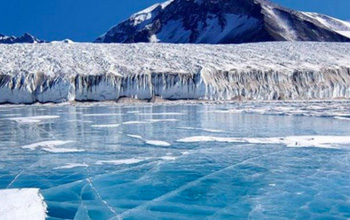NSF Awards $4 million for a National Polar Education and Arts Program
September 8, 2022
The U.S. National Science Foundation’s Office of Polar Programs (OPP) in the Directorate for Geosciences (GEO) and the Directorate for Education and Human Resources (EHR) have awarded $4 million to Oregon State University to facilitate and manage the Polar Science, Technology, Engineering, Arts, and Mathematics (Polar STEAM) initiative.
The Polar STEAM initiative encompasses and enriches two longstanding efforts:
- Support for writing and artistic projects specifically designed to increase the public’s understanding and appreciation of the Antarctic and the human endeavors on the southernmost continent, known as the Antarctic Artists and Writers (AAW) program
- Support for educators, both formal and informal, to travel to the Antarctic and Arctic to work collaboratively with researchers, referred to as the Polar Educators program
"Decades of NSF-supported research and education activities in the Arctic and Antarctic has led to important discoveries about our global environmental systems and break-throughs in our understanding of the universe.” says Dr. Alexandra Isern, assistant director of Geosciences. “Polar STEAM will leverage NSF’s substantial polar-focused research initiatives to increase the public’s understanding of and appreciation for all the exciting scientific research underway at the poles.”
Educators, artists and writers who participate in the initiative will be given unique professional development opportunities in the Arctic or Antarctic through research station residencies and virtual and in-person experiences.
Polar STEAM is a joint venture between two NSF directorates, showing broad commitment to STEAM education efforts within NSF. “Incorporating art into STEM learning experiences allows students of all ages to access science from different vantage points and from a variety of learning paradigms and social contexts. To this end, the integration of art in STEM connects to a broader swath of learners, by sparking curiosity, creativity and critical thinking, as well as promoting academic engagement and greater understanding,” says EHR assistant director, Dr. James L. Moore III. “Underscoring the significance of this new initiative, three of the four EHR divisions are supporting this effort.”
By combining these long-standing programs, Polar STEAM will strengthen both the AAW and Polar Educators programs in parallel but also build synergies between them. OSU’s world-class polar research is allied to a deep portfolio in STEAM, which is reflected in the University’s explicit strategic goal of being a visionary in the integration of the arts, humanities, sciences and engineering. “We anticipate that the new program will provide stronger ties between polar scientists, educators at all levels, artists and writers, and will result in greater public access to and appreciation for the challenges and excitement of the NSF’s scientific endeavors at the poles.” says Lisa Rom, OPP Program Officer.
The U.S. National Science Foundation propels the nation forward by advancing fundamental research in all fields of science and engineering. NSF supports research and people by providing facilities, instruments and funding to support their ingenuity and sustain the U.S. as a global leader in research and innovation. With a fiscal year 2023 budget of $9.5 billion, NSF funds reach all 50 states through grants to nearly 2,000 colleges, universities and institutions. Each year, NSF receives more than 40,000 competitive proposals and makes about 11,000 new awards. Those awards include support for cooperative research with industry, Arctic and Antarctic research and operations, and U.S. participation in international scientific efforts.
Connect with us online
NSF website: nsf.gov
NSF News: nsf.gov/news
For News Media: nsf.gov/news/newsroom
Statistics: nsf.gov/statistics/
Awards database: nsf.gov/awardsearch/
Follow us on social
Twitter: twitter.com/NSF
Facebook: facebook.com/US.NSF
Instagram: instagram.com/nsfgov

